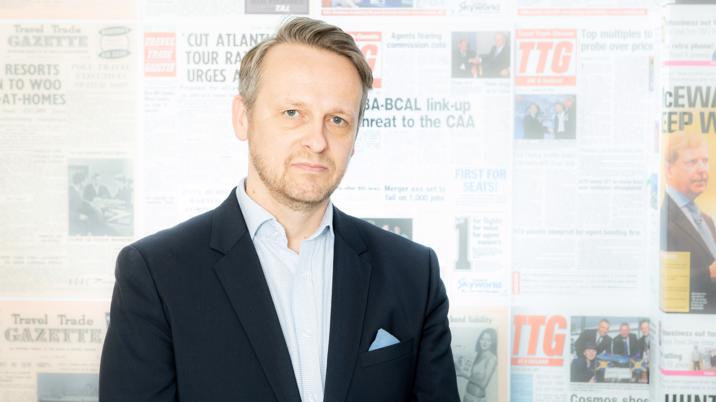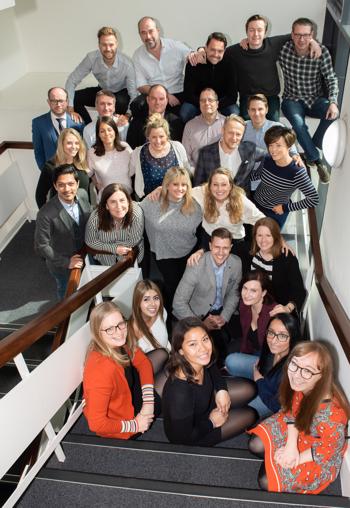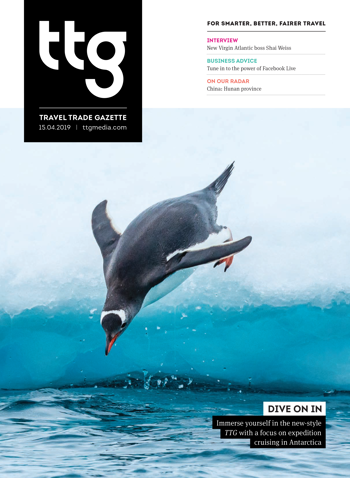
In almost a decade since Daniel Pearce joined TTG, the travel industry weekly, two things have taken him by surprise. The first is the enduring strength of TTG’s core readership: travel agents. The second is the continuing appeal of print.
“It’s very easy to think everyone books travel online now and that travel agents are dead. You read a story in the press about Thomas Cook being in trouble or another airline going bust, and you think it’s a difficult industry. But the travel industry has evolved – and continues to evolve – in a really positive way,” he says.
“Sure, there aren’t the same volume of high street travel agents these days. But there are a hell of a lot more work at home travel agents, a lot of online travel agents tailor-making holidays, a lot of luxury travel agents tailor-making, too.”
He continues: “There has been a huge shift in travel from taking orders – people behind desks in high street travel agents waiting for people to come in, to proactive travel consultants advising how best to spend that £3,000 on your next trip.
“This industry doesn’t need rallying, it’s in a really strong position. And it is great to be a part of that.”
As an independent publisher you have the flexibility you need to crack on and do stuff.
Durability of print
By the same measure, talk of the demise of print is also misplaced.
“Whilst I’d not want to suggest we are a business all about print – print is just one element of what we do – the resilience of the magazine has been another powerful lesson learned over the past nine years,” Pearce adds.
“When I took over as editor in 2010, I didn’t know and wouldn’t have bet money on how much longer it was going to carry on publishing. But I now have a much clearer understanding of our need to continue our commitment to publishing a weekly magazine.
“It continues to be profitable. And I’d stick my neck out and say it continues to have a long-term future as part of a business with a lot going on in digital and events. Why? Because it’s all about serving our communities in whatever way they want.”
The latest circulation figure for the controlled circulation title is 16,233 (July 2018-June 2019, ABC).
Pearce’s confidence in just what TTG readers want is informed by detailed research conducted late last year ahead of a redesign of TTG that went live in April.
The redesign was the latest in an ongoing series of developments, enhancements and additions to the TTG business since Pearce led an MBO of the title from its previous owner, UBM, in 2013.
The world’s oldest travel trade newspaper, TTG was launched as Travel Trade Gazette in 1953 by its founders Ted Kirkham and Leslie Stone and built a solid reputation, brand name and publishing business over the decades that followed.
By 2010, however, it was one of a number of B2B brands in which UBM was starting to lose interest as its focus shifted towards brands more closely aligned with exhibitions.
Back then was a challenging time to join the title, Pearce readily admits.
“Post the economic downturn, there had been a lot of team changes, reduced headcount and a fairly demoralised team. TTG still had a great reputation for news and was a really strong brand, but it is fair to say it had been slower than some other B2B brands to respond digitally,” he says.
To make matters worse, Pearce adds, TTG was being actively targeted by a competitor intent on putting the title out of business. But it was also a point in the title’s history that offered significant opportunity.
The challenges, though daunting, also inspired a concerted fight back.
Between 2010 and 2013, Pearce and his team focused on consolidating TTG’s strengths. Even so, the title remained an “unloved asset” in the UBM stable and towards the end of this period Pearce, by then brand director, was briefed to ready the title for sale.
A new mission statement – ‘For smarter, better, fairer travel’ – was introduced across the magazine and corporate branding.
New lease of life
“It was during that process that I had the idea to put something together myself, and managed to make that happen. I got some funding. UBM were agreeable. And the new, independent business (TTG Media) took over TTG on November 1, 2013,” he continues.
Immediately, all the clichés about being able to be nimbler, take more risks, and act faster proved true, Pearce says: “We were 16 people. We were profitable from day one.”

The team’s initial efforts prioritised evolving TTG’s most profitable areas – events and digital, while maintaining the quality and integrity of the print product on which the brand was built.
One significant early investment was upscaling the annual TTG Travel Awards – reinventing it from a standard B2B awards dinner into a theatrical experience at The Lyceum, home to The Lion King, with an after-event at The Savoy. The change put more focus on the awards themselves, adding value for commercial partners and boosting revenues. The new-look event is now in its sixth year.
Another was the development in 2015 of the TTG Lesbian, Gay, Bisexual and Transgender initiative – a network to champion diversity in the industry, which led to a series of ongoing conferences and seminars.
Then there was the launch in 2016 of the TTG Top 50 Travel Agencies programmes – a six-month programme culminating in an annual awards dinner at The Vox Birmingham, and then the TTG 30 Under 30 which annually identifies 30 future industry leaders and enables them to network with today’s movers and shakers.
Quarterly magazine TTG Luxury was redesigned and went on to win a British Media Award, and a series of luxury travel-themed events was then developed. TTG’s international business – the title is published locally, under licence, in a number of overseas markets – was “tidied and standardised”. TTG’s website was also redesigned.
Meanwhile, TTG’s team grew and went from strength to strength – doubling in size, to 32, between 2013 and 2018/9 – and according to Pearce, turnover over the same period has followed “a similar growth pattern”.
In 2017, TTG editor (now group editor) Pippa Jacks was awarded Editor of the Year (Business Media) at the PPA Awards. A year later, Jacks’ successor – current TTG editor Sophie Griffiths – was named Editor of the Year at the PPA Independent Publishers Awards 2018.
There are always crises in travel and there always will be – companies going down, volcanoes going off, other dilemmas.
Root and branch redesign
A number of things then happened at once. In 2018, research was undertaken to better understand what the TTG audience wanted and how TTG can and should best respond. Designers were appointed to redesign the weekly TTG publication. And an internal project got underway to explore TTG’s purpose and positioning.
The result was a striking new look and bold positioning for TTG and TTG Media – the fruits of more than £50,000 investment.
Out went covers featuring industry figures, replaced by National Geographic-styled inspirational photography with more creative use of photography inside, too, where there is now a greater emphasis on in-depth industry coverage and personality-led interviews.

The title was downsized to Stylist proportion and publication date shifted to a Monday – both steps that created deeper clear blue water between TTG and its competitors.
The magazine switched to 100% recycled paper – part of an ongoing commitment to becoming more sustainable, as it had recently switched to compostable bags – and an internal project to tighten circulation in order to further reduce wastage soon gets underway.
Meanwhile, a new mission statement – ‘For smarter, better, fairer travel’ – was introduced across the magazine and corporate branding, challenging the industry and also everyone within TTG Media to deliver a better future for the industry (and clients) they serve. All of the changes, Pearce insists, have been well-received.
Looking to the future – as TTG Media is now doing as it formulates its next five-year strategy – challenges as well as opportunities lie ahead.
“Within the travel market, there will be a lot of debate around tourism and its environmental impacts and how this will impact on the business,” Pearce points out.
“There are always crises in travel and there always will be – companies going down, volcanoes going off, other dilemmas. But the industry continues to grow and this will continue. And it is fantastic to be a part of this.”
The environment is also a pressing issue in publishing, of course. But for Pearce, as pressing is the challenge of continuing to evolve TTG at pace and with its particular, distinctive approach.
“Running any business is a challenge. But I believe in today’s marketplace that it is as an independent publisher you have the flexibility you need to crack on and do stuff,” he says.
“Clearly, as an independent, you can’t have all the skillsets you need in house which makes it really important to work with the right external partners.
“That’s why over the last nine years, understanding that the best partnerships are between people with shared values – working with people you like within a relationship in which you want to grow things for each other rather than just for yourself – is one of the most important lessons I’ve learned.”
The best partnerships are between people with shared values … in which you want to grow things for each other rather than just for yourself.
This article was first published in InPublishing magazine. If you would like to be added to the free mailing list, please register here.










